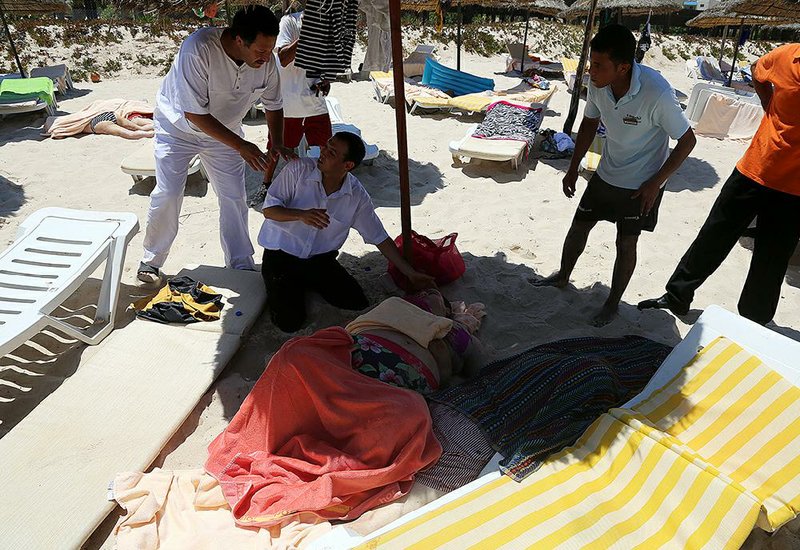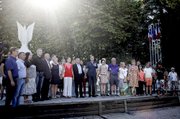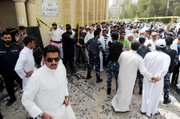SOUSSE, Tunisia -- A young man pulled a Kalashnikov rifle from a beach umbrella and sprayed gunfire at European sunbathers at a Tunisian resort Friday, killing at least 39 people in one of three deadly attacks that followed a call to violence by Islamic State extremists.
The shootings in the Tunisian resort of Sousse happened around the same time as a bombing at a Shiite mosque in Kuwait and an attack on a U.S.-owned factory in France that included a beheading. In all, the assailants killed at least 67 people.
The Islamic State claimed responsibility for two of the attacks, which came days after the militants released a recording urging their followers "to make Ramadan a month of calamities for the nonbelievers."
The attack in Tunisia happened just months after a March 18 massacre at the national Bardo museum in Tunis that killed 22 people, again mostly tourists.
"Once again, cowardly and traitorous hands have struck Tunisia, targeting its security and that of its children and visitors," President Beji Caid Essebsi said at the RIU Imperial Marhaba hotel, near the beach rampage site.
Essebsi promised "painful but necessary" measures, adding: "No country is safe from terrorism, and we need a global strategy of all democratic countries."
At a news conference at his office in the capital Tunis, Prime Minister Habib Essid said he would immediately close mosques outside the control of the Ministry of Religious Affairs and call army reservists into active service and place them around the country.
"No mosque that does not conform to the law will be tolerated," he said, referring to those that promote extremism.
Rafik Chelli, the secretary of state of the Interior Ministry, said the attack was carried out by a young student not previously known to authorities. At least 36 people were reported wounded in the shooting rampage, which ended when the gunman was shot to death by police.
The SITE Intelligence Group said the Islamic State group claimed credit for the attack on its Twitter account later Friday and identified the gunman as Abu Yahya al-Qayrawani.
The carnage in Tunisia began on the beach, where tourists described hearing what sounded like fireworks and then running for their lives when they realized it was gunfire. Video of the aftermath showed medics using beach chairs as stretchers to carry away people in swimsuits.
"He had a parasol in his hand. He went down to put it in the sand and then he took out his Kalashnikov and began shooting wildly," Chelli said of the gunman.
He then entered the pool area of the Imperial Marhaba hotel before moving inside, killing people as he went.
British tourist Gary Pine said he was on the beach with his wife around noon when heard the shooting. They shouted for their son to get out of the water, grabbed their bag and ran for the hotel. Their son told them he saw someone shot on the beach.
There was "sheer panic" at the hotel, Pine said. "There were a lot of concerned people, a few people in tears with panic and a few people -- older guests -- they'd turned their ankles or there was a few little minor injuries and nicks and scrapes."
The Health Ministry said the dead included Tunisians, British, Germans and Belgians, without giving a breakdown.
British Foreign Secretary Philip Hammond said at least five Britons were killed, but he said he expected the toll to rise because a high proportion of the dead were believed to be British.
Since overthrowing its secular dictator in 2011, Tunisia has been plagued by attacks by terrorists although only recently have they targeted the tourism sector, which makes up nearly 15 percent of the country's gross domestic product. Nearly half a million Britons visited Tunisia in 2014.
In Britain, police said they were tightening security at major events after Friday's attacks, including for the weekend events of Armed Forces Day and London's gay-pride festival.
The attacks were condemned by the United Nations, the U.S., Israel and others.
Pentagon spokesman Col. Steve Warren said it was "too soon to tell whether or not these various and far-flung attacks were coordinated centrally or whether they were coincidental."
International police agency Interpol offered investigative help. Interpol Secretary-General Juergen Stock said the attacks "show the truly global dimension to current terrorist threats."
Head Hung on Gate
In the attack in southeastern France on Friday, a truck driver once under surveillance for radical Islamic ties crashed into an American-owned chemical warehouse and hung his employer's severed head on a factory gate.
The suspect, Yassine Salhi, who was apprehended soon after the attack, is the latest French citizen implicated in extremist bloodshed in recent years after being flagged to authorities then falling off the radar.
The attack began about 9:30 a.m., when Salhi drove a utility truck to the gate of the Air Products factory in Saint-Quentin-Fallavier, southeast of Lyon, authorities said.
Prosecutor Francois Molins said Salhi was known to factory staff members because he regularly made deliveries there, and they let him in the gate. Once beyond the sight of security cameras, Salhi plowed his truck into gas canisters in a factory warehouse, touching off an explosion that wounded two people, Molins said.
A knife and the decapitated body of Salhi's employer were found at the scene of the explosion, and the severed head was posted on a gate at the factory entrance with two flags bearing proclamations of Islamic faith, the prosecutor said.
Salhi was in custody Friday evening along with his wife, sister and another person, while police sweeps of the vehicle and the suspect's apartment were continuing, the prosecutor said.
No group immediately claimed responsibility for the factory attack, but the severed head mimicked the Islamic State's practice of beheading prisoners and displaying their heads.
Police were put on higher alert in the Lyon area after the assault, which revived fearful memories of attacks in France in January on a kosher market and satirical newspaper that left 20 dead.
"Islamist terrorism has again struck France," Prime Minister Manuel Valls said.
French President Francois Hollande said a security alert for the southeastern region was raised to its highest level for the next three days, and the U.S. Embassy in Paris warned American citizens to be vigilant.
Mosque Suicide Bombing
Minutes after the France attack and 3,000 miles away, a man wearing a suicide belt walked into a Shiite mosque in Kuwait City and detonated himself among worshipers gathered for Friday prayers.
The Islamic State claimed responsibility for the bombing, which killed at least 27 people and wounded scores of others -- the first such attack in the relatively secure nation in more than two decades.
The bombing struck the Imam Sadiq Mosque in the residential neighborhood of al-Sawabir, one of the oldest Shiite mosques in the predominantly Sunni Arab nation where at least a third of the population is believed to be Shiite Muslim.
The explosion ripped through the back of the mosque, near the door, as worshipers stood shoulder to shoulder in group prayer, said one witness, Hassan al-Haddad. He said other worshipers behind him recounted seeing a man walk in, stand in the back with other congregants and then detonate his device.
A posting on a Twitter account known to belong to the Islamic State affiliate that calls itself the Najd Province claimed the explosion was the work of a suicide bomber.
It was the third attack in five weeks to be claimed by Najd Province -- a name that refers to the central region of Saudi Arabia. The upstart Islamic State branch had claimed two prior attacks on Shiite mosques in Saudi Arabia that killed 26 people in late May.
The Islamic State extremists regard Shiite Muslims as heretics. The group's statement said the bombing targeted a "temple of the apostates."
Witness Ahmed al-Shawaf said he heard a man interrupt the prayer by shouting "Allahu akbar," which means "God is great" in Arabic. The man then yelled out something about joining the Prophet Muhammad for iftar, the dusk meal at which Muslims break their daytime fasting during Ramadan. Then the blast occurred, al-Shawaf said.
The Interior Ministry said in a statement that 27 people were killed and 227 were wounded, all of them males, including some boys.
For decades, Kuwait has been among the safest and quietest corners of the Middle East. It suffered an invasion under former Iraqi leader Saddam Hussein in the first Persian Gulf War, but has not traditionally been a target of terrorist attacks.
Soon after Friday's attack, Kuwait's ruler, Emir Sabah Al-Ahmad Al-Sabah, visited the bombed mosque. The Cabinet convened an emergency session in the afternoon.
Arab leaders from across the Persian Gulf region condemned the attackers, but some Kuwaitis turned their anger at their own government, saying the country's leaders should have been more involved in protecting Shiites.
Abdullah al-Neybari, a secular former lawmaker, said the Kuwaiti government "is not doing what it should be doing to fight extremism in the country. "
"This is a wake-up call to fight harder," he said.
Information for this article was contributed by Ben Wiacek, Paul Schemm, Bouazza Ben Bouazza, Jill Lawless, Greg Katz, Shawn Pogatchnik, Angela Charlton, Jamey Keaton, Philippe Sotto, Lori Hinnant, Maggy Donaldson, Raphael Satter, Michael Rubinkam, Robert Burns, Hussain Al-Qatari, Aya Batrawy and staff members of The Associated Press and by Liz Sly, Brian Murphy, Mustafa Salim, Hugh Naylor and Karla Adam of The Washington Post.
A Section on 06/27/2015



